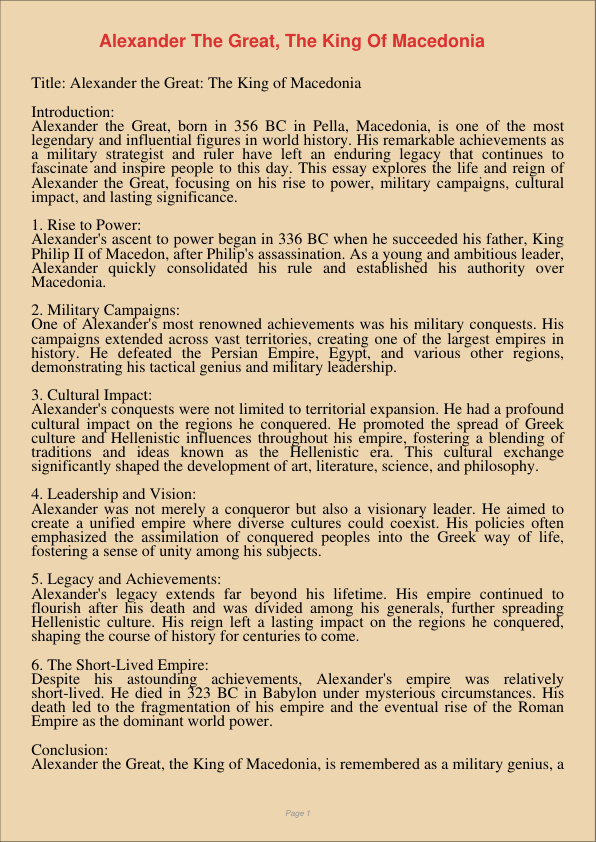
Title: Alexander the Great: The King of Macedonia
Introduction: Alexander the Great, born in 356 BC in Pella, Macedonia, is one of the most legendary and influential figures in world history. His remarkable achievements as a military strategist and ruler have left an enduring legacy that continues to fascinate and inspire people to this day. This essay explores the life and reign of Alexander the Great, focusing on his rise to power, military campaigns, cultural impact, and lasting significance.
-
Rise to Power: Alexander’s ascent to power began in 336 BC when he succeeded his father, King Philip II of Macedon, after Philip’s assassination. As a young and ambitious leader, Alexander quickly consolidated his rule and established his authority over Macedonia.
-
Military Campaigns: One of Alexander’s most renowned achievements was his military conquests. His campaigns extended across vast territories, creating one of the largest empires in history. He defeated the Persian Empire, Egypt, and various other regions, demonstrating his tactical genius and military leadership.
-
Cultural Impact: Alexander’s conquests were not limited to territorial expansion. He had a profound cultural impact on the regions he conquered. He promoted the spread of Greek culture and Hellenistic influences throughout his empire, fostering a blending of traditions and ideas known as the Hellenistic era. This cultural exchange significantly shaped the development of art, literature, science, and philosophy.
-
Leadership and Vision: Alexander was not merely a conqueror but also a visionary leader. He aimed to create a unified empire where diverse cultures could coexist. His policies often emphasized the assimilation of conquered peoples into the Greek way of life, fostering a sense of unity among his subjects.
-
Legacy and Achievements: Alexander’s legacy extends far beyond his lifetime. His empire continued to flourish after his death and was divided among his generals, further spreading Hellenistic culture. His reign left a lasting impact on the regions he conquered, shaping the course of history for centuries to come.
-
The Short-Lived Empire: Despite his astounding achievements, Alexander’s empire was relatively short-lived. He died in 323 BC in Babylon under mysterious circumstances. His death led to the fragmentation of his empire and the eventual rise of the Roman Empire as the dominant world power.
Conclusion: Alexander the Great, the King of Macedonia, is remembered as a military genius, a visionary leader, and a cultural influencer. His remarkable conquests expanded the boundaries of known civilization and created a lasting legacy that continues to be celebrated. While his empire may have been short-lived, his impact on the world has endured through the centuries. Alexander’s life and achievements remain a testament to the heights that human ambition, leadership, and determination can reach in the pursuit of greatness.
「真诚赞赏,手留余香」
真诚赞赏,手留余香
使用微信扫描二维码完成支付
